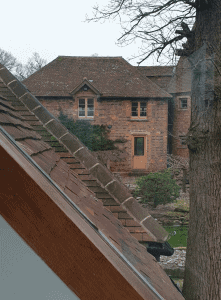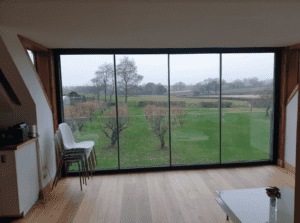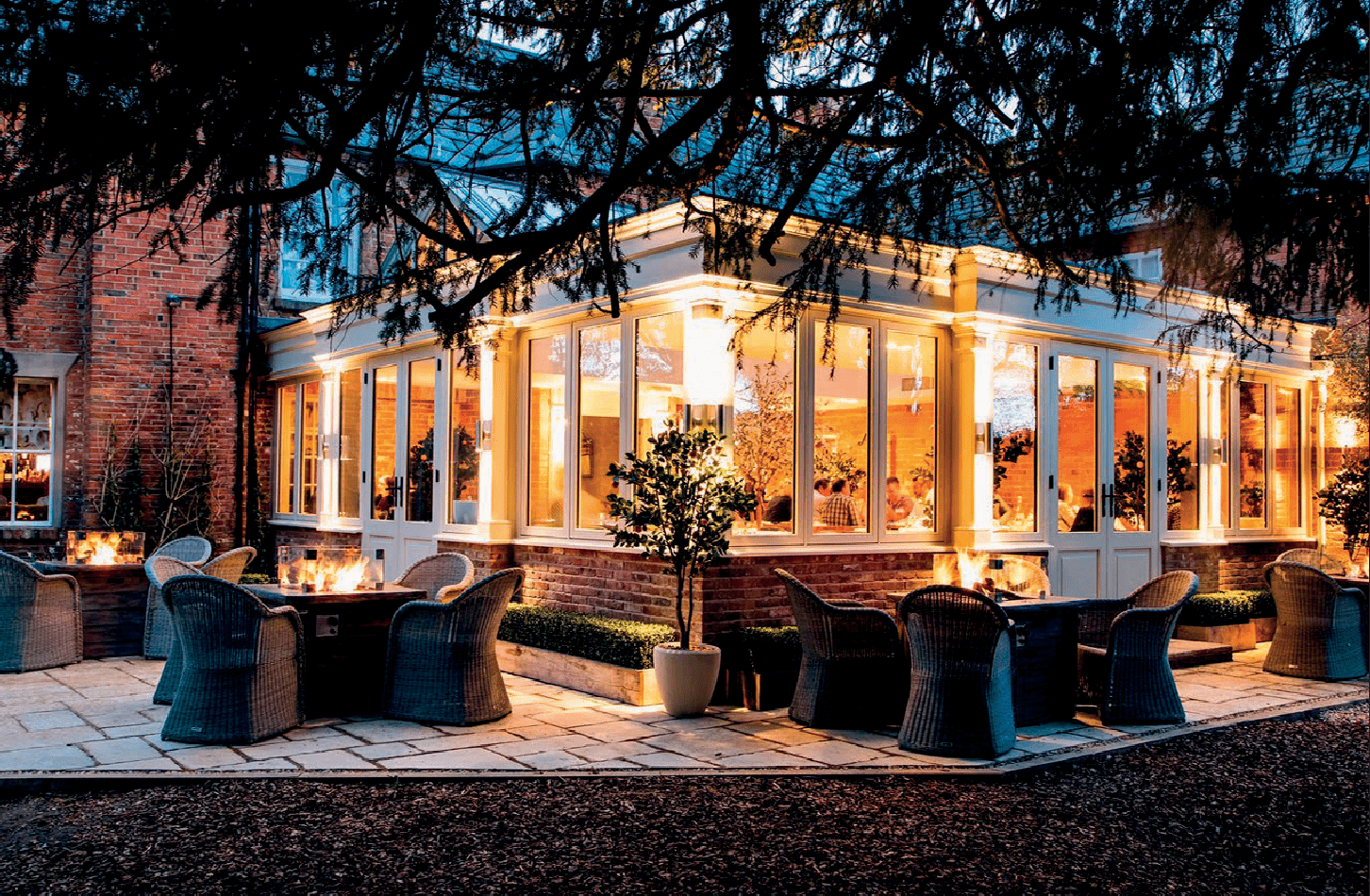Rural Idyll
B&B Week is being held this month providing you with an opportunity to promote your property, encourage direct bookings and broaden public awareness of the huge choice of enchanting experiences that can be enjoyed so much more than staying in a hotel. Bill Lumley visits Hurst Farm in Crockham Hill near Edenbridge, where owner Victoria Sachiko has an abundance of lucrative promotional ideas for her business.
Set in stunning Kent countryside close to the border with Surrey is Hurst Farm, a xx-acre working farm which for the last three years has been home to a luxury B&B. The B&B is an extension to the main house built between 1390 and 1410 – a period spanning Richard II and Henry IV.
The farm – just 30 minutes by train from London yet in the middle of the countryside – was originally called Bayleaf Farmstead. The timber-framed house was a building originally known as Wealden hall and was re-erected at the Weald and Downland Living Museum in Singleton, near Chichester.
The B&B extension was built in 2015 as a nest egg for the owner Victoria whose daughter, Arabella, is studying A levels, while her son, Alexander, is preparing to go off to university.
True to the original adjoining structure, the extension is timber-framed, some of the wood conveniently taken from the property’s own oak trees. It comprises four en suite bedrooms sleeping up to 10 guests, with a self-contained, fully-equipped kitchen/dining/seating area. The entire east-facing gable to one side of the living area is a huge glass panel providing stunning views of the surrounding countryside.
The timber-framed extension was built as a modern response to the main house, with glass instead of wattle and daub attracting a great amount of light, but the construction itself is ancient in design, hence the vast amount of timber. The wood that came from oak trees in their own woods – cut down and milled on the field with a mobile saw mill that planed it – saved a bit of money on the overall projects, but ultimately there was insufficient wood that they were entitled to cut down to complete the extension. “There are some wonderful old rules about being able to take down so many cubits of wood every quarter day,” Victoria recalls.
All the guestroom beds have Egyptian cotton linen, luxury toiletries, a hair dryer and superfast Wi-Fi. They are all also equipped with smart light switch technology that enable guests to set their preferred level of subtle lighting in each of the rooms.
In stark contrast to the comparative cold and poor light of the neighbouring original 600-year-old house where Victoria and her family live, the modern and massively over-engineered B&B is a sumptuous haven of luxury.
Rural reception
One of the first things I noticed about the place when I visited was the remarkable strength of the Wi-Fi, which took me by surprise given the dramatically rural location of the B&B, and the fact that I had by this time discovered there is virtually no mobile phone reception in the village.
The superb Wi-Fi came about, Victoria says, as a result of the whole community getting together “to make it happen”.
“We have a very active village,” she says. “A lot of people who live here work in London, and with the move to working from home, the demand for Wi-fi was enormous.”
A combination of government grants and a very active community, the complex infrastructure to deliver Wi-Fi was implemented using a combination of masts and cabling that runs underground through a neighbouring field.
“My mother owns a fair amount of farmland, where we dug trenches to carry wires carrying the Wi-Fi. BT was not going to do anything about it, so we had to. It’s a community project, and the people in the community pay for it,” she says.
Even this carefully planned solution has its flaws. The village Wi-Fi is powered from the corner of the cow barn and the Wi-Fi unit itself is contained in a cupboard on the side of the barn, which recently needed a lightbulb needed changing above one of the bays. She called an electrician as the fitting was so high up, when, all of a sudden, phones were ringing and vans were showing up, she says. “He had turned off the power and as a result the Wi-Fi for the whole village went out!” Lesson learned.
TV-free zone
The awe-inspiring symmetrical aesthetics of the B&B’s guest rooms are not spoiled by the visual disruption of TVs. Victoria deliberately chose not to install televisions in the room, a point she asserts both on the website and in the booking confirmation email.
She is helped in this policy by the good Wi-Fi: guests are overwhelmingly able to find an alternative source of entertainment to TV on their phones, laptops or tablets.
Victoria says: “Televisions are noisy, expensive, cumbersome, and usually either too big or too small. I have to be quite specific about the fact that the rooms have no TV, as people sometimes expect one. I put it specifically in the confirmation letter as people don’t always read the small print.”
She recalls one of her first guests, a businessman, who expressed dismay that there was no TV. “He said he wondered what he was going to do that night,” she says.
The next day she took him his breakfast. “He said he had had a brilliant time, sitting on the sofa looking out through the big window for three hours watching the flights taking off and coming into land at Gatwick. It turned out he was a plane spotter.
“He promised a great review, and I was really excited, but it turned out to be for an obscure plane spotter magazine,” she recalls.
Hurst Farm B&B does attract a fair number of plane enthusiasts as it is also near Biggin Hill airport, she says. “In the summer there is a Spitfire experience when you actually get to fly in a Spitfire. That’s one expensive experience. People ask for £50 off the room when I know they are spending £2.5k on the Spitfire experience…I think not!”
She recalls one guest who came back from the experience telling the story of a gentleman ahead of him who was 90 years old had been given the experience for his birthday, for he had flown spitfires in the war.
“He brought along all his old log books and his medals. His first reaction was that his family had spent way too much money on something he used to be paid to do, before he discovered he wasn’t actually going to be allowed to fly the plans himself! Although of course a 90-year-old was not insured to fly this antique airplane,” she says.
Promotional ideas
Victoria is full to the brim with ideas for promoting her B&B business. Most recently she came up with a practical way of taking advantage of its proximity to Gatwick airport.
She says: “Using social media I advertised the fact that if anyone happens to be scheduled to take an early morning flight from Gatwick airport, they should come and stay with us the night before their flight. They can have a lovely early morning breakfast, leave their car here and let us arrange a car to take them to the terminal.
“The car is safe here, and it is quicker to get from here to your terminal than it is to go to some of the offsite parking places. So long as you stay at least one night you can have free parking here. We have lots of space here and can easily accommodate an extra four cars,” she says.
Events business
She currently developing an events business to run in tandem with the B&B and to enable her to stage other lucrative events such as private dining evenings. The kitchen and dining area between the B&B and the 600-year-old hours is large and a stunning space that can easily lend itself to creative events. Victoria is friends with former master chef Peter Bayles, whose services she called upon when one guest had a 30th birthday party where the sister of the birthday girl hired the whole B&B for friends.
“They had a slap-up, amazing, four-course dinner here cooked by the former master chef,” she says. “The guests didn’t have to go out anywhere, and at the end of the evening they all just rolled upstairs, had a lovely breakfast the next morning and off they went.
“It’s really special, instead of going to a restaurant, to have the chef come here and you have the place to yourself and the cachet of a master chef cooking for you,” she adds.
She also runs supper clubs at the B&B. “A friend of mine opperates a food experience company and runs one-off events. She hires an expert in some cooking field to come here and give a certain amount of corresponding tuition. The guests bring their own alcohol, and we have 15-20 people some of who will stay here, some of whom live locally, and they learn about a particular cuisine,” she says.
Victoria is also planning a curry night coming up in the spring with another former master chef contestant coming to teach guests how to cook curry. “It’s half way between being in a restaurant and having a class,” she says.
This month she is also planning an oyster-tasting day, and in May she has a florist coming in to present a flower arranging course.
“This downstairs kitchen-and-dining space between the B&B and the old house is just a really useful room to do that kind of thing, and guests can stay, although sometimes it is just local people who do not need to book a room for the night,” she says.
She says she first hooked up with master chef Peter Bayles with a view to him providing courses, such as a game day, where he would teach how to prepare and cook game followed by a big dinner, before people would drift upstairs at the end of the evening. “It turned out that most of the guests were local and they didn’t need to come and stay. So, I ended up with different guests up in the B&B and a separate collection of guests down here.”
It was a sound learning experience, she says. “For the first course he did, I kept the rooms free so people could book to stay the whole weekend, but it just didn’t work, so now I don’t do that. If someone wants to come and stay, they just book a room and pay for the cookery course on top. Otherwise it is too difficult and too risky – I could end up with nobody here at the weekend and everyone cooking down here. So now if you want to come and spend the night if there is one free, they can have it.”
Weddings
She is starting to realise the potential of building her business with a focus on weddings. “I’ve been utterly inspired by people who come and stay here compelling me to hold weddings. We have wedding parties staying here, including a couple who stayed recently who said they were getting married in a tepee in the woods,” she says.
“I just want to start out very simply when it comes to hosting weddings: hire out the field, the gardens and the B&B and let the wedding party do what they like. If they wish to erect a marquee they can do so. If they plan to do it completely outdoors, of course, they will need to have a backup plan because the weather can turn bad.”
The marquee idea has great potential for as illustrated in the wedding feature (page 24), marquees are on average the second biggest expense budgeted for by the newly-weds-to-be.
Duke of Edinburgh Awards
Another avenue of business Victoria is considering is providing accommodation and activities for the residential section of the Duke of Edinburgh gold award, where participants are required to be away from home for four nights doing a particular residential activity.
“It can be voluntary. There are many cookery courses. When you are doing the gold DoE you are preparing for your A levels and going off to university, and you know nothing. You can’t cook a chicken, work a washing machine or do anything practical domestically.
“There are a lot of such courses I could run here, and I know a lot of chefs. Rather than simply doing a cookery programme, I could run preparation-for-university-courses, encompassing laundry as well as cookery, how to budget, living away from home for the first time, how to make friends when there is nobody you know, and learning to live in shared accommodation.
“That would be a good way of filling rooms out of season. It would have to be school holiday time Christmas and spring holiday, because in Summer I’m on my knees.”
Two or three courses of that nature per year would be quite useful, she reflects. “That fills weekdays. Weekends are not such a problem, but on weekdays you tend just to get the odd person coming to stay while they work in Oxted. Quite often they will go the Travelodge because they know it and it’s easy and they know what they are getting, but some people really dislike those kind of places, and this is perhaps £20 more, it’s closer to where many of them want to be, and these people come regularly – it’s only one night at a time but it is often once a month.
“They become repeat business. The first time they will have booked via an online travel agent, and then I can give them a 10% discount if they book direct.
Boarding schools
In the Kent/Surrey part of the world where Hurst Farm is situated there are a large number of boarding schools from where the B&B says she gets a fair amount of business.
She explains: “Typically these are kids from overseas when they have an exeat weekend. For example there is a little Russian girl who goes to Woldingham School some 15 minutes’ drive from here. It’s too far to go home for the weekend to Moscow, so her mum comes over here and stays half a dozen times a year. I’ve got to know them so well I drive her to the airport at the end of term.
“I had a Chinese family staying the other day looking for schools they wanted to educate their girls in England, so they did a tour of public schools around here. They have an agent who suggests five schools for them to visit.
Children love it here – they love the animals, going out and feeding the chickens.
Renovation revisited
She looks back at the decision to invest in the extension to run a B&BH. “We had a beautiful old house which had a horrible old kitchen, and decided we needed a decent kitchen. We extended the house to the maximum the council would allow to build a family room.”
There was a certain amount of pressure to get on with the plans at the time, she says. “We could see the writing was on the wall as the local council was planning to cut back dramatically on permitted development rights, and they would not allow us to do it for much longer. So, we extended it and got into B&B. and they were cutting down on what you were allowed and were not to build.”
The result was a dramatic renovation using top-quality materials and first-rate build that cost a fortune.
Victoria sums it up: “I now have a really good product and I have to utilise it as much as I possibly can, which is one of the reasons to get into events. The potential is huge.”
Fortunately for her, she is a people person, and she says she really enjoys running the business and meeting the guests. “It is very hard work and I love doing it and I love devising events. It is just a matter of actually doing it and getting the punters to come and stay – heads in beds.
“There is so much potential to do something with the space we have here. I just worry about committing myself to doing too many disparate things and in the process watering down the product.”
The house
When the decision was made to build a decent kitchen, she also decided to employ an architect who was not great on being an architect but who had some great advice. Victoria says: “We lived in a cold and dark historic house. He helpfully advised us get the listed building officer on your side, and to achieve this the first thing to do was get an archaeological survey done.”
This survey yielded some surprising results for the family, which is now in its third generation of occupancy at the property. “I’ve lived in the old house on and off since I was 16 years old. My parents bought he farm, my grandmother used to live in the oast house where my mother now lives, and I have taken over the house another generation down.” While the old house is medieval, the rest of the buildings on the farm such as the oast house are Victorian.
The archaeological survey concluded that the mediaeval hall house was built between 1390 and 1410. “There were two rooms either side with a fire in the middle and the animals lived in there too, and we went to the museum to see what our house would have been like 600 years ago. It was smokey and disgusting,” she recalls.
At the end of the ground floor in the old house is the sitting room and above it is her daughter’s bedroom. “I could never understand why it was bigger than the sitting room when it had the same footprint. I discovered it is because it was originally one of those classic jettied houses with a smaller ground floor and the first floor overhung it. Over the intervening years the overhang was filled with stone so the downstairs now has really thick walls, but upstairs rooms don’t,” she says.
The property is documented at the museum in Singleton thus: “Bayleaf Farmstead Bayleaf – perhaps the most iconic building to be re-erected at the Museum – is a timber-framed Wealden hall house from Chiddingstone in Kent. It has six rooms, four on the ground floor and two upstairs.
“The house was built in two phases. The earliest part consisted of an open hall and service end. This was probably attached to an earlier structure, which stood where the solar or upper end bay now stands. It is believed that the upper end bay that gave the building its present form was added in the early 16th century, replacing the earlier structure.”
Upstairs living space
The design of the living space was influenced by a picture Victoria saw of a property in Pennsylvania with one completely glass gable end. “I thought that was what we needed to do. Through there is where the sun sets,” she says.
“If you go out into the orchard, my ground floor has three panels of glass. The upstairs opens up completely and, in the summer, I barely shut it. It’s an outdoor space on the first-floor level; you can sit and have breakfast or sit there in the evening and it is gorgeous.”
She finds the living space built within the B&B to be very useful for many of her guests. “We built it in a flexible way that we could let it as a self-sufficient holiday let. They could have it for the entire week. The living space has its own fully equipped kitchen and dining room area, and they can use the pool and walk around the grounds without coming into the main house. It is a self-contained unit and therefore needed a separate kitchen living room dining area.
“It has been an absolute godsend with families with young children who may just want to heat a bottle of milk and they don’t have to come and trouble me, they can give their kids tea, my daughter can babysit while they go out and have dinner. They feel comfortable not invading anybody else’s space.”
Downstairs kitchen
Victoria considers the kitchen and breakfast area as a kind of buffer area between her property and the B&B. “When there aren’t that many visitors, I will serve breakfast upstairs if it is perhaps just two sittings of two people. I’m very comfortable with them wandering around here. That door is where my private life starts,” she says, indicating the door at the far end of the klitchen leading through to the family house. “It’s a very sociable space and I love it when the parents linger over breakfast, the kids play with the dog outside and everybody’s happy.
Although there is space in the dining area for a table for each room, she has chosen to have just one long table at which to serve her guests breakfast, which also works very well on dining and cooking evenings.
“One single dining table works so well,” she says. “You can get four nationalities together. I find it quite awkward, breakfast with people in individual groups at little tables.”
She compares the communal dining experience with her own experience when skiing with her family at a chalet in France. “Everyone eats together, and you talk about what you are going to do today, and you arrange to meet up for tea somewhere with total strangers, and by the end of the week you are the best of friends.
“I’ve met people who actually know some of my friends. You can be chatting to this stranger, and suddenly express amazement that you’re talking to someone who knows someone you know, or who went to the same school my children went to. Just chatting makes people feel more comfortable and less tense.”
Of course, she admits, the communal dining table is not for everyone, occasionally resulting in a problem that needs to be resolved.
“Occasionally you get people who don’t like it, for example they may not be staying there for entirely holiday reasons. I like to try and accommodate people and can serve breakfast upstairs for example,” she says.
Country walks
The B&B is in spectacular walking country, and Victoria has devised a number of circular walks where guests can simply leave their car, walk out through the gated and not have to think how they are going to get back to the car in order to get home again. The walks range from three to 12 miles in length. However, when she has guests navigating the North Downs Way, which stretches all the way down to the south coast through the unusually large area of outstanding beauty, the B&B occasionally welcomes guests who show up without a car.
She recalls: “A couple who came with a backpack were due to turn up on New Year’s Day, and I found everywhere around here was closed for food. So, I asked them what they wanted and got them a bottle of red wine, a salad a choice pie, left it for them in the fridge and they had a lovely evening upstairs on their own without having to go out.”
Inevitably given the nature of the B&B business, her experience of running it has not been without one or two awkward situations. And she is philosophical towards this: “I have learned that you can tell right away if someone is going to be happy here or not. While most people are, not everyone buys into this way of having a B&B.
“Occasionally you get people who want the full hotel experience where I have to go into their room and make their beds and replace the towels each day – which I am happy to do. I have said to people if you lock your door during the day then I am not going in your room. If you leave it unlocked, I will go in and empty your bin and fold your towels. If you are staying for a week, I will give you a mid-week linen change, but it is not a hotel, it is a B&B,” she says.
She recalls one couple who were ill at ease with the setup. “They did not get the communal breakfast in particular” she says. “The husband come up to me while I was cooking to say they would not be staying that night. I said that was fine, that I could see it was not their thing. He offered to pay, but I said I wouldn’t charge them for the second night, as it wasn’t anything I had done, but it didn’t match up with what they wanted.
“And they wrote me a horrible review anyway!”
She illustrates the steps a B&B owner has to take sometimes to control unnecessarily harsh reviews. “Another woman who came the following summer to meet her daughter complained when she arrived that there was no coffee-making facility in the room. I drew her attention to the fact that the Nespresso machine is situated in the sitting room. But she insisted she wanted her privacy.
“I then spent about two and a half hours finding her another place to stay. She wanted the whole place to herself including the swimming pool. She ended up going to a Hilton which had an indoor swimming pool, and coffee-making facility in the room, and I even changed her daughter’s railway ticket – I stopped her staying here. I can’t stop people writing a review if they stay here and if they don’t stay, they can’t.”
The more reviews you get the easier it is to read between the lines, she says. “The poor reviews can be often show they obviously have an agenda about something.
“There are somethings you can’t control, like last summer was so hot and it is impossible to keep the rooms cool – it’s England and we don’t have central air conditioning. I just have to say I’m really sorry, it’s hot I can’t do anything about that,” she says.
The B&B opened three years ago and Victoria says: “I couldn’t have done this 20 years ago without the internet and without the support of a company like eviio. My greatest panic fear for instance is getting a double booking. I can’t because it is a single master calendar. I hate paying booking.com that percentage, but a percentage of a lot of money is better than no percent of nothing.
“It’s a double-edged sword, and when you start you are grateful for what you can get. I do say to people if you are coming again – and I do get a lot of repeat business – do phone me up or send me an email.”
B&B Week
Victoria says she did not get involved with National B&B Day when it was launched last year but can now see the great potential for lucrative promotions offered by its successor National B&B Week, scheduled for 18-24 March this year.
“I am now getting on board with it all – it is my livelihood, and I need to get more proactive rather than just waiting for people to find me on booking.com. I need to join that community of people,” she says.
Putting together ideas for offerings she could make for B&B Week she considered offering tea and cake for guests when they arrive that will be attractive to people, favouring something of this nature over the offer of a private tour of Hever castle which she says is quite specific. “I’d like it to be general so I can fill the rooms. If they are coming to stay here it is likely they are going to see the castle anyway,” she says.
She settled on arranging a deal with her local pub, The Royal Oak. “I went up there for dinner and can report that the new management is doing a great job. The place was busy and the food good. We have arranged the following for guests staying here during National B&B Week:
Book a room at Hurst Farm B&B during National B&B Week and have a free starter or dessert with your meal at our lovely village pub, the Royal Oak, which is within easy walking distance of your accommodation.
Ts and Cs: Reservations must be made direct on the dedicated website (www.hurst.farm) or by telephone (01732 870246). Meals must be for 2 or more people and include main courses. NB The pub is closed all day Monday and does not serve supper on Sunday evenings.”





